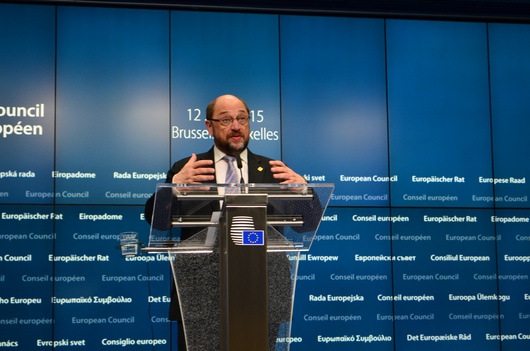
More surveillance in Schengen?
Published on
Translation by:
Una DimitrijevicThe January terror attacks on Charlie Hebdo and a kosher supermarket in Paris have caused European leaders to react.
The response of some quickly mutated into a demand for the protection of the Schengen Territory and the control of information, or to put it another way, for the protection of our borders and citizens.
Since the attacks in Paris, the allegedly sacrosanct treaty for the freedom of movement has been one of the principal topics of conversation within Europe's institutions. This week, during the European summit, the discussion focused on determining resources in the fight against terrorism; the central point of the program being the initiation of the Passenger Name Record (a database that would gather personal information on passengers of airline companies). Is it a key measure or just an old trick?
Changes in Progress
The two main supporters of the proposal for a modification of Schengen are Spain and France, countries which are weighing in with their desire to establish routine inspections at external borders. Up until now, the only measures in place have been non-systematic passport checks by police, and only if the person presented a high-risk profile.
The president of the European Commission, Jean-Claude Juncker, settled the matter during the European summit on February 12th in Brussels, by stating that the Community executive “does not see, for the time being, the need for a re-examining of the Schengen standards”. It is not the first time, and it will not be the last, that Schengen is targeted. However, it would seem that “for the time being” it will remain unchanged.
 The president of the European Parliament, Martin Schulz, was also opposed to the modification of the treaty for the freedom of movement, and evoked another point during his press conference: “The problem is that information is not sufficiently shared between the various Member States (...) However, in order to be able to share information, we must first collect it. For this reason, the launch of a European PNR is important.” Yesterday, the Heads of State and government agreed on the creation of this database of information concerning air passengers by the end of 2015; a mechanism which could violate people's right to privacy.
The president of the European Parliament, Martin Schulz, was also opposed to the modification of the treaty for the freedom of movement, and evoked another point during his press conference: “The problem is that information is not sufficiently shared between the various Member States (...) However, in order to be able to share information, we must first collect it. For this reason, the launch of a European PNR is important.” Yesterday, the Heads of State and government agreed on the creation of this database of information concerning air passengers by the end of 2015; a mechanism which could violate people's right to privacy.
The Committee on Civil Liberties of the European Parliament had already, in April 2013, rejected the Commission's proposal on the creation of the PNR, leaving it floating through the meanders of parliamentary red tape. Today, the 28 leaders of the EU are asking once more for members of the European Parliament to approve this mechanism.
From this same standpoint, the president of the European Council, Donald Tusk, also tried to apply pressure during the plenary meeting in Strasbourg on January 13th, by stating that “if we do not succeed in setting up a single European PNR, we will end up with 28 national systems. That would leave us with a veritable patchwork, threatening the privacy of citizens without providing them with effective protection." Spain and 24 other European countries are indeed already working on the implementation of an information processing system intended for this purpose.
When the "how" matters
 In December 2014, the Spanish government approved, contrary to the opinion of the entire parliamentary opposition, the hugely controversial organic law (ed. a law approved by Congress that still has to pass through the Senate) on citizen safety, aimed at curbing dissent and popular protest. With this law, already known as the “gag law”, misdemeanours can lead to fines ranging up to 30,000 euros. This change, which will oblige certain affected citizens to pay legal taxes, is without precedent.
In December 2014, the Spanish government approved, contrary to the opinion of the entire parliamentary opposition, the hugely controversial organic law (ed. a law approved by Congress that still has to pass through the Senate) on citizen safety, aimed at curbing dissent and popular protest. With this law, already known as the “gag law”, misdemeanours can lead to fines ranging up to 30,000 euros. This change, which will oblige certain affected citizens to pay legal taxes, is without precedent.
And as a crowning glory, the types of punishable behaviour include demonstrations in front of Congress or lack of respect towards the police and security forces. Through the use of this law, the government is also trying to legalise “hot expulsions”, namely the return of migrants to Ceuta and Melilla once they are on Spanish territory, thus denying them the right to legal assistance and asylum request.
It is precisely because of the changes to this controversial law in the Senate that the ruling People's Party wants to offer a legal backing to PNR. The process has been quite questionable. To introduce an amendment to a pending law suggests a faster process, less debate and less public information emanating from constitutional institutions.
Thus, in one sure blow, they are sparing themselves from public argument, technical contributions or legislative correction. The solution they are selling to citizens was already being spun well before the security crisis faced by European countries after the Paris attacks. Governing through fear is never a good idea.
Translated from Schengen y sus circunstancias



